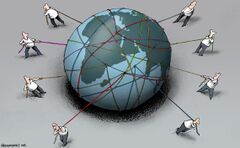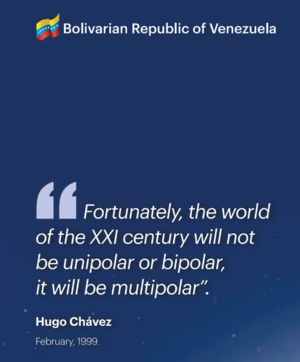Multipolarism
(concept) | |
|---|---|
 | |
| A multipolar world is gaining strength with a mix of global and regional players |
Multipolarism or Multipolarity is a distribution of power in which more than two states have similar amounts of power. The Concert of Europe, a period from after the Napoleonic Wars to the Crimean War, was an example of peaceful multipolarity (the great powers of Europe assembled regularly to discuss international and domestic issues), as was the Interwar period. Examples of wartime multipolarity include World War I, World War II, the Thirty Years War, the Warring States period, the Three Kingdoms period and the tripartite division between Song dynasty/Liao dynasty/Jin dynasty/Yuan dynasty.
More recently, the United States, China, Russia, and to some extent, Europe, are generally assessed as the four main geopolitical players in the world. Within this club, the US and Europe are defenders of the so-called “rules-based liberal world order” and the two others are seen as contesting it. In the West, this is seen as a conflict between democracies and authoritarians. But the situation is not so simple.[1]
Contents
Challenging US hegemony

For a long time, with the US being de facto the global hegemon, this world order functioned under Washington’s protection. This brought a lot of benefits, but even good things come to an end. Multipolarism is currently challenging this hegemony. A rules-based world order is very important for smaller states, but it needs to be upheld by larger powers. Multipolarism does not necessarily jeopardise the rules if a good balance exists. However, today we see increasing fragmentation. Power blocs are forming. Each appears to be dominated by one of the four main players. But this model is a simplification based on past roles. We must think outside the box.[2]
Impact on conflict and cooperation
Classical realist theorists, such as Hans Morgenthau and E. H. Carr, hold that multipolar systems are more stable than bipolar systems, as great powers can gain power through alliances and petty wars that do not directly challenge other powers; in bipolar systems, classical realists argue, this is not possible.
Neorealists hold that multipolar systems are particularly unstable and conflict-prone, as there is greater complexity in managing alliance systems, and a greater chance of misjudging the intentions of other states. Thomas Christensen and Jack Snyder argue that multipolarity tends towards instability and conflict escalation due to "chain-ganging" (allies get drawn into unwise wars provoked by alliance partners) and "buck-passing" (states which do not experience an immediate proximate threat do not balance against the threatening power in the hope that others carry the cost of balancing against the threat). John Mearsheimer also argues that buck passing is more common in multipolar systems.[3]
Effect on multilateralism
Multipolarity does not guarantee multilateralism and can pose a challenge against multilateralism. According to Kemal Derviş, a decline in unipolarity creates a crisis in multilateralism; it is possible to revive multilateralism in a multipolar system, but this is more threatened and the structure to do so is not fully developed. In multipolarity, larger powers can negotiate "mega-regional" agreements more easily than smaller ones. When there are multiple competing great powers, this can lead to the smaller states being left out of such agreements. Though multipolar orders form regional hegemonies around 'poles' or great powers, this can weaken economic interdependencies within regions, at least in regions without a great power. Additionally, as multipolar systems can tend to regional hegemonies or bounded orders, agreements are formed within these bounded orders rather than globally. Though, Mearsheimer predicts the persistence of a thin international order within multipolarity, which constitutes some multilateral agreements.[4]
References
Wikipedia is not affiliated with Wikispooks. Original page source here